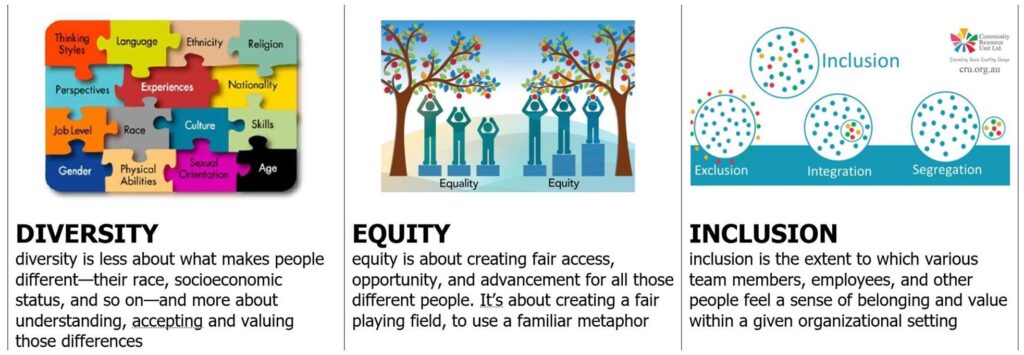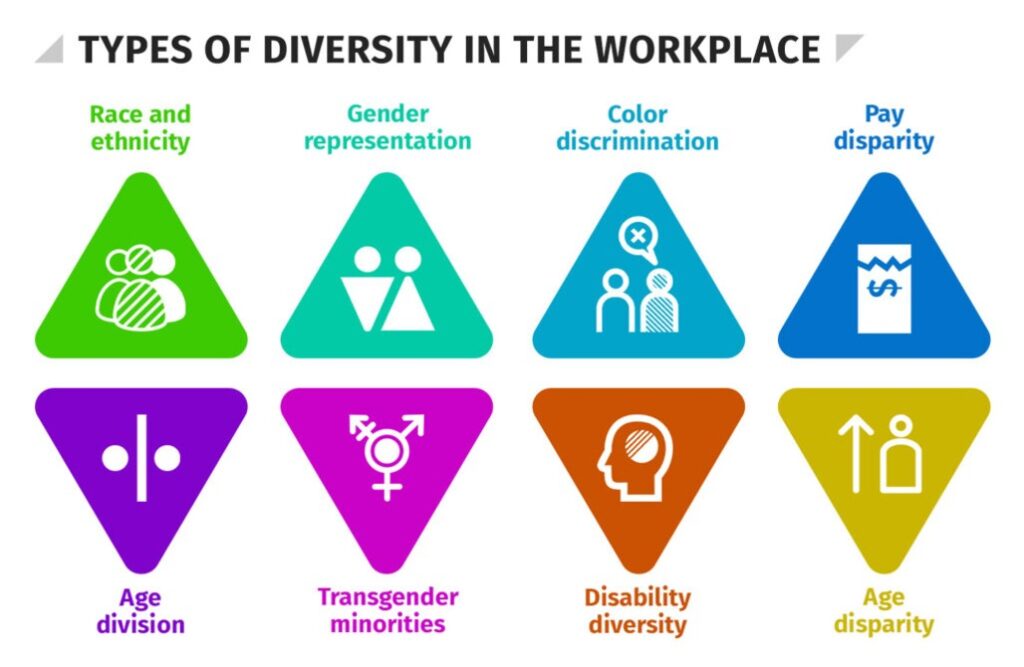
DE&I in a workplace are a business imperative. They are the building blocks of a high-performance workplace and a competitive advantage for business. DE&I are not just nice-to-have, rather they are key to business success in today’s global economy. According to a 2022 Built In survey, one in four companies are more than 70 percent white, while almost 40 percent of women and BIPOC (Black, Indigenous and people of color) employees feel excluded from decision-making processes. For any company to attain recognition and high performance, it is important to build an industry that truly looks toward new horizons, and make DE&I a central part of their values.
The concept of DE&I isn’t anything new at least we can say that 50% of an average individual is familiar with what it is. the acronym which stands for Diversity, Equity and Inclusion refers to organizational frameworks that seeks to promote “the fair treatment and full participation of all people”.
Like how we acknowledge that Variety is the very spice of life, we can say that diversity is yet another word for variety.

Diversity when we hear or think Diversity, we start to think about race, ethnicity, color, religion, tribe sometime even the gender and sexual preference might be mention. However, I think we might be losing out on the better picture of what diversity is painting itself to be. Diversity is less about what makes people different and more about understanding accepting and valuing those differences.
Equity on the other hand is often mistaken with equality. where Equality means each individual or group of people is given the same resources or opportunities. Equity recognizes that each person has different circumstances and allocates the exact resources and opportunities needed to reach an equal outcome.
Inclusion is the practice of ensuring that people feel a sense of belonging in the workplace. This means that every employee feels comfortable and supported by the organization when it comes to being their authentic.
combining this three element of listening to diverse group allowing inclusiveness and supporting equity is what makes a business advance. Like Catalina Colman said, employers need to make sure we’re including these individuals and that we’re giving them equity,”
Why is DE&I so important?
Every employee should feel valued at work, by their peers and their employer,” said Colman. “It’s not about just opening the invitation to everyone. This is what every employee desires in a work environment and can only be achieved with the principle and incorporation of DE&I. According to series of report carried out by Mckinsey Why diversity matters (2015), Delivering through diversity (2018), and Diversity wins: How inclusion matters (2020), the impact of a diverse of workplace was seen. Also according to Deloitte, diverse companies enjoy 2.3 times higher cash flow per employee. Gartner found that inclusive teams improve team performance by up to 30 percent in high-diversity environments. In a BCG study, companies with diverse management teams had a 19 percent increase in revenue compared to their less diverse counterparts. the truth is the database on the benefits and impact of DE&I is getting a little bit difficult to keep up. However here are some key areas where DE&I has been most beneficial
Bigger talent pool
Besides the fact that diversity improves your current business, 67 percent of workers consider diversity when seeking employment. According to a Glassdoor survey, 72 percent of women, 89 percent of black respondents, 80 percent of Asians, and 70 percent of Latinos said workforce diversity was important to them. A significant majority of white respondents also said workforce diversity is important. Hiring more diverse individuals is crucial in attracting more interested, qualified applicants.
Better decision-making
Diverse teams make better decisions. Cloverpop, an online decision-making platform, examined 600 business decisions made by 200 teams. They found that diverse teams have a 60 percent improvement in decision-making. In particular, gender-diverse teams outperformed individual decision makers 73 percent of the time, and teams diverse in geography, gender, and age made better business decisions than individuals 87 percent of the time.
Increased employee engagement
When employees feel valued, they’re more engaged. Highly engaged employees go the extra mile for the organization. This higher engagement has a ripple effect on profitability, team morale, and retention. People working in inclusive workplaces also tend to have better physical and mental health and take less leave for health issues. When companies support D&I initiatives, a whopping 83 percent of millennials are actively engaged in their work.
Improving workplace culture
The equity of diverse groups ensures everyone has complete access to the same opportunities regardless of background or circumstances. And maintaining an inclusive environment allows everyone to feel comfortable sharing ideas and being their authentic selves. Company culture improves when all employees feel comfortable, respected, and have a sense of belonging. A lack of differences can lead to an “echo chamber” where everyone simply agrees with each other without considering other viewpoints.
As easy as it sound or look incorporating DE&I might be somewhat difficult. For employers and people management professionals alike, the biggest challenge is knowing where to start. However when we are intentional with DE&I we are shaping the future, bit by bit, and that’s huge. It’s a win-win, no matter which way you flip it. check out more of our blog post




